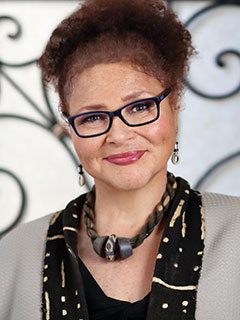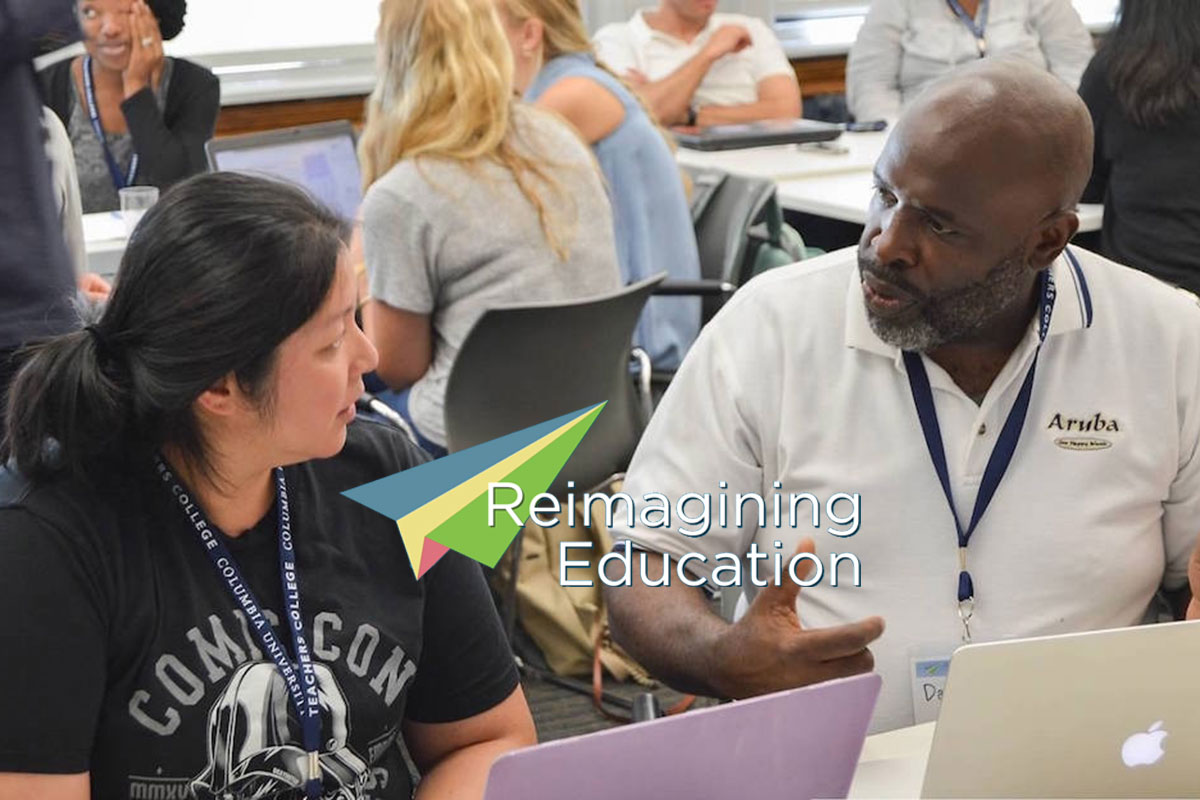In the wake of widespread racial unrest and Black Lives Matter protests against on-going police brutality, Teachers College will host its fifth annual Reimagining Education: Teaching, Learning and Leading for a Racially Just Society Summer Institute beginning on July 13th.
The event, which will be held entirely online, is expected to enroll more than 1,000 attendees, hailing from locations that range from New York City to Cairo, Egypt, and including large contingents from districts such as Huntsville, Alabama and Seattle, Washington.
[The Institute is now sold out of passes for the full proceedings, but special passes are still available for the plenary sessions only, without professional development credits. Visit the Institute registration site for more information. The online format will make for a more complicated schedule than at past Institutes. All Plenary Sessions and "Pool Parties" — dialogue sessions — will be streamed during the period of July 13-16, with more live or synchronous workshops on July 17. All pre-recorded, asynchronous programing will be available until July 24th. See the full Reimagining Education 2020 Program.]
As in other years, the Institute’s purpose is to provide much-needed professional development for teachers as well as school and district leaders in becoming racially literate and culturally responsive in their teaching and leadership.
“Given that the vast majority of educators in the United States are white, and the majority of public-school students are of color, this professional training is critical,” says the Institute’s Executive Director, Amy Stuart Wells, Professor of Sociology & Education. “And TC is the only school of education in the country with the faculty, students and staff to provide this much expertise and support regarding issues of race and education in one Institute.”
“Reimagining is about dreaming about a different future – and then once you dream – how do we bring that dream to life?” notes Christopher Emdin, Associate Professor of Science Education at TC and one of the faculty organizers and presenters of the event.
In a keynote address titled “The Stories We Tell and the Fire This Time,” Lisa Delpit, MacArthur “genius grant” recipient and author of Other People's Children: Cultural Conflict in the Classroom and Multiplication Is for White People": Raising Expectations for Other People’s Children, will discuss the need to decenter “the white colonial mentality that underlies America’s public education system,” and to replace the racial narratives that frame standard curricula.

DECENTERING WHITE COLONIALISM In her keynote, author Lisa Delpit will take on the mindset that she says underlies American education. (Photo: TC Archives)
This year’s Institute will also include many sessions that specifically respond to the COVID-19 pandemic and the racialized health disparities it has spotlighted. The pandemic and the ongoing racial justice issues underscored by the recent killings of George Floyd and other black Americans relate directly to the mission of the Institute, which is offering two new strands of content, one to address health disparities and the other to focus on issues of racial justice in higher education. In addition, the Institute will reprise its Teacher Leadership and Youth Voices strands from past years.
“Our message is that now, more than ever, is the time to reimagine education to address the racial hierarchy that shapes the current system in terms of how students’ different racial and ethnic backgrounds are valued in our schools,” says Wells. “When the COVID crisis initially hit, the question was whether and how we could have an Institute. Now, in the wake of not only the pandemic, but also the protests against racial injustice, the challenge is how to accommodate and support so many dedicated educators who sense the urgency of this moment.”

A TC PRESENCE Faculty from eight of TC's 10 academic departments — including, from left, Chris Emdin (science education), Erica Walker (mathematics education), Detra Price-Dennis (digital literacy), Charles Basch (health and education) and Yolanda Sealey-Ruiz (English education) — are leading sessions at the Institute. (Photo: TC Archives)
Tapping the breadth and depth of the TC faculty expertise on issues of race and education, the Institute brings together eight different Departments in the College, from Curriculum & Teaching to Math, Science & Technology and Health & Behavioral Sciences. Among the sessions to be led by TC faculty are “Storytelling in Mathematics: How Students Create and Remix Curriculum,” featuring Erica Walker, who is Director of TC’s Institute for Urban and Minority Education (IUME), Clifford Brewster Upton Professor of Mathematical Education, and Chair of the College's Math, Science and Technology Department; “Speculative Pedagogy as a tool for Reimagining Education,” featuring Detra Price-Dennis, Associate Professor of Education; “Time and Connection: Nurturing Social Responsibility and Solidarity,” featuring Michelle Knight-Manuel, Professor of Education; “The Role of Teacher Leaders Today,” featuring Felicia Moore Mensah, Professor of Science Education; and “The Reimaginers: What History Teaches About Replacing Curriculum and Doing School Differently,” featuring Ansley T. Erickson, Associate Professor of History & Education (and Co-Director of TC’s Center on History & Education).
“Reimagining Education is more important than ever right now,” says Price-Dennis, “because educators are looking for spaces to think with each other about how to develop curriculum and pedagogies that are anti-racist as well as responsive to their students racial, cultural, ethnic, and linguistic backgrounds in ways that account for intersecting identity markers. RESI provides this space and facilitators who can work with teachers to imagine an equity-oriented approach to pedagogy rooted in justice.”
Our message is that now, more than ever, is the time to reimagine education to address the racial hierarchy that shapes the current system in terms of how students’ different racial and ethnic backgrounds are valued in our schools.
— Amy Stuart Wells
In other sessions, Charles Basch, Richard March Hoe Professor of Health & Education and an authority on the connections between student health and successful learning, will focus on the issue of health disparities created by the COVID crisis. And Angel Acosta, who received his TC doctorate in Curriculum & Teaching in May, will introduce educators to principles of healing-centered pedagogy. Acosta, an education consultant who has worked with schools, colleges, corporations and nonprofits, combines practices from social and emotional learning, restorative justice and trauma-informed teaching. He will be offering a workshop in which participants contemplate a timeline of racial, class and gender inequalities that have occurred since 1619 — the year the first slaves were brought to American shores — and explore their own feelings while bearing witness to those of others.
Our message is that now, more than ever, is the time to reimagine education to address the racial hierarchy that shapes the current system in terms of how students’ different racial and ethnic backgrounds are valued in our schools.
— Amy Stuart Wells
Another signature feature of the Institute each year are the Pool Parties, where the participants can debrief and unpack the content of the plenary sessions in inter-racial discussions.
“As we move forward to provide an online version of the Institute, we will continue to explore issues of race, racism and inequality within education and society more broadly,” says Institute Director Phillip Smith, who received his Ph.D. from TC this past fall, “Thus, our pool parties are of critical importance in not only creating space for us to collectively understand the disproportionate impact of a double pandemic – a health pandemic in COVID 19, and race pandemic evidenced through racism, anti-Blackness, and the dehumanization of Black Lives. Through these dialogues we will intently consider our role and responsibilities as educators to address these issues as we move towards a reimagined education and racially just society.”
Reimagining is about dreaming about a different future – and then once you dream – how do we bring that dream to life?
— Christopher Emdin
Still another important strand of the Institute will focus on higher education.
“One of the ironies of our education system is that higher education, which has been more successful in its legal defense of the educational benefits of diversity, using policies such affirmative action to foster demographic diversity, actually lags behind the K-12 system in creating culturally relevant and sustaining teaching,” says Wells.
As in past years, there will be a strong youth component to the 2020 Institute. Joseph Derrick Nelson, a faculty member at Swarthmore College and an adjunct professor in TC’s Sociology & Education Program, is coordinating the different youth groups. The gathering will feature a presentation by a group of high school students from some of Long Island’s poorest and wealthiest school districts who have been working with Erase Racism, a non-profit on Long Island to create a curriculum on structural racism. Erase Racism is an important partner with the Summer Institute every year, bringing nearly 40 educators to the Institute. The Long Island youth work and the educators’ participation in the Institute funded by the Rauch Foundation, headed by TC Trustee Nancy Rauch Douzinas.
This year’s Institute will also feature return engagements by Cyphers for Justice (CFJ), a youth and educator development program housed within IUME in which youth work alongside Columbia University and Queens College students, professors, and community-based teaching artists to conduct research and present their findings on relevant social issues. This year, CFJ will highlight their findings around disparities related to COVID-19. CJF was co-founded and is co-directed by TC alumnae Jamila Lyiscott, Assistant Professor of Social Justice Education at the University of Massachusetts Amherst and IUME Senior Research Fellow, and author of Black Appetite. White Food: Issues of Race, Voice and Justice In and Beyond the Classroom; and Limarys Caraballo, Associate Professor of English Secondary Education at Queens College-CUNY and consortium faculty in the Urban Education doctoral program at the CUNY Graduate Center.
Wells says she is thrilled with this year’s program.
“We’re always trying to get people to look beyond schools to see the broader context of education,” she says. “Where so many other professional development programs offer a quick fix of one new lesson plan or instructional strategy, we give educators a framework for understanding racial inequality and the tools to apply that framework to their practice. I think that is much more valuable.”
